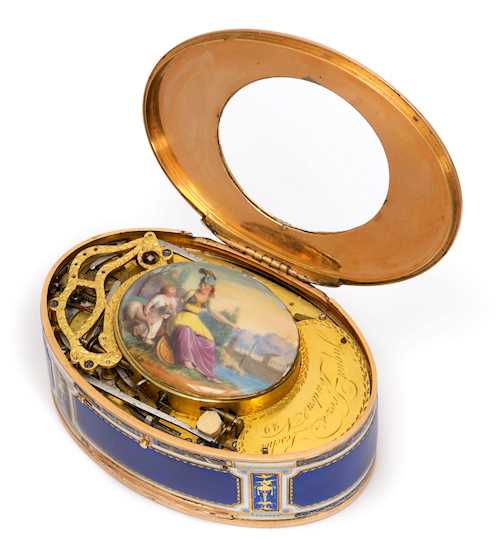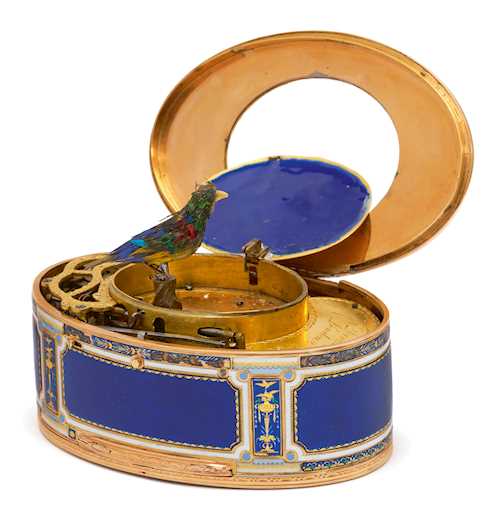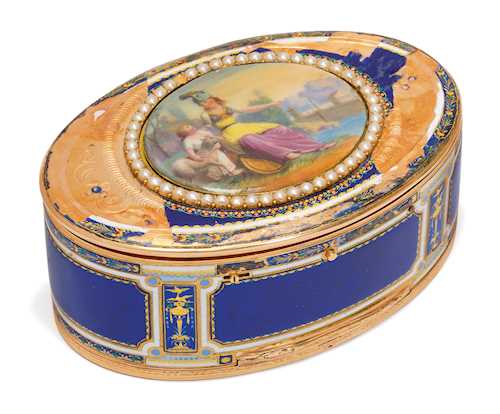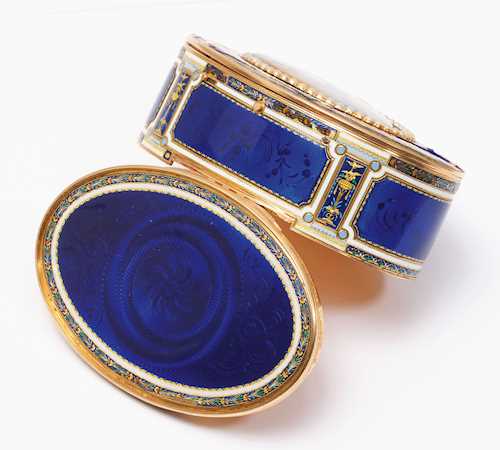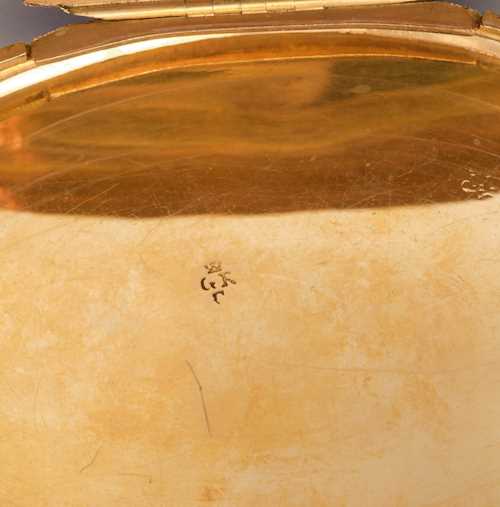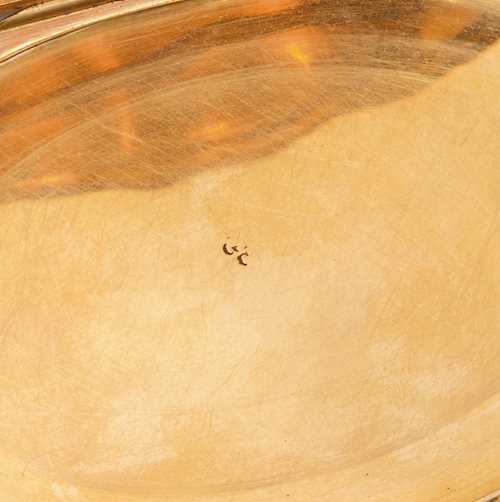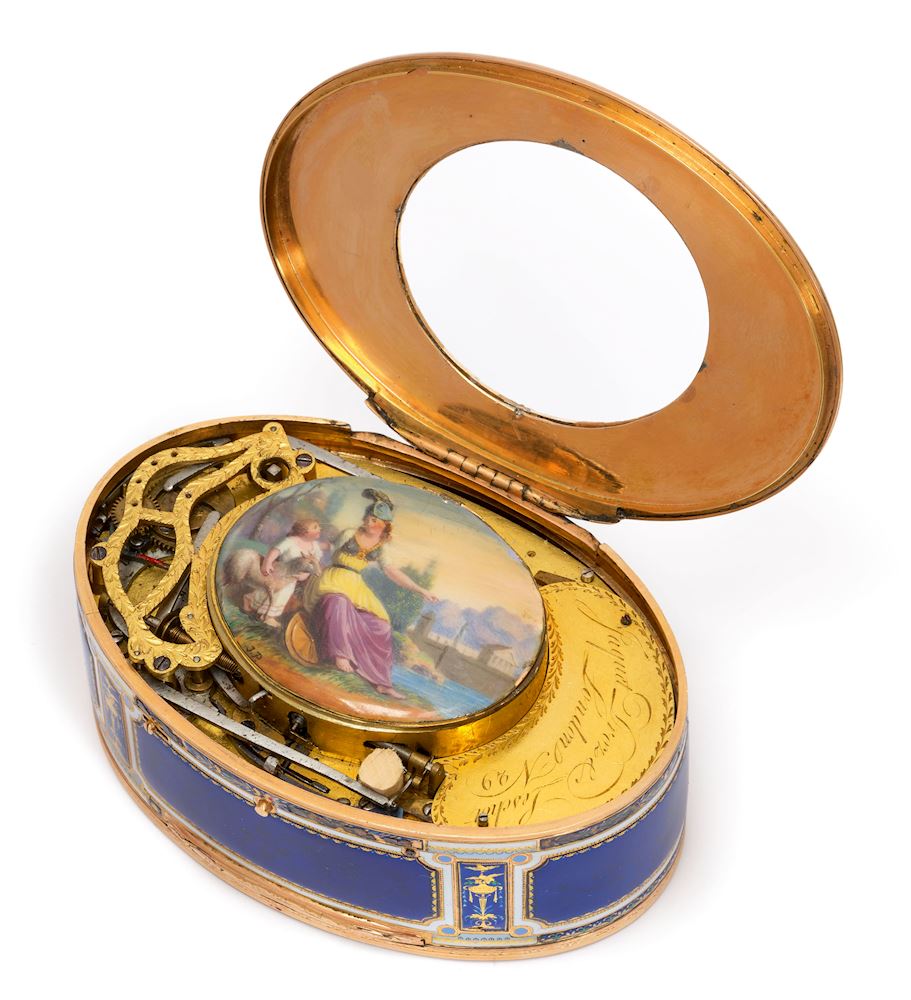
拍品 1121 - A208 家具、瓷器&银器 - Donnerstag, 21. März 2024, 01.30 PM
RARE GOLD ENAMEL BOX WITH SINGING BIRD AUTOMATON
Geneva, ca. 1790, signed Jaquet-Droz & Leschot London and marked N 29, Maker's mark GRC under a crown for Georges Rémond & Cie.
Oval gold box, engine-turned and overlaid with translucent blue enamel. The wall divided into four rectangular fields, framed in white and with leaf-shaped borders in gold. In between, rectangular reserves painted with torches and doves. Floral friezes form the top and the bottom. The hinged lid originally designed accordingly (enamel defective), with an additional oval lid in the center in a pearl-set recess, painted with Minerva sitting by a river with a child and sheep. Monogrammed JP (Jean-Théodore Perrache, born Geneva 1744). Below, a small songbird turning and whistling. Fine mechanism with bellows and whistle(s). The winding mechanism and parts of the movement are concealed under the main lid. Side plate with the signature. Underneath the hinged base lid, which is enameled to match the box, there is a hidden compartment.
8.8 × 6 × 4 cm.
Enameling on the lid heavily damaged, partially present in fragments. Minor chips. Missing cogwheels incl. wind vane roller visible, movement not functional. To be restored.
Provenance:
- Galerie Koller Zurich, November 1964, lot 1327.
- Private collection, Switzerland (acquired in the above auction).
Pierre Jaquet-Droz (1721-1790) was the founder of one of the most important watchmaking dynasties of the 18th century and was considered a master of his trade in the field of figurative musical automatons, technically sophisticated clocks and singing bird automatons, which took him to the great royal courts, where he presented his masterful achievements.
Together with his son Henri-Louis Jaquet-Droz (1752-1791) and his adopted son Jean-Frédéric Leschot (1746-1824), he developed the company into an empire with several branches, including one in London, where he opened a branch in 1775 and, through his close business relations with the famous 18th century goldsmith and merchant James Cox, developed a flourishing export business with his luxury goods all over the world, as far away as China and the imperial court, where the demand for the finest clocks and astronomical instruments was particularly high.
After the death of Pierre and Henri Jaquet-Droz in 1790/1791, the company was continued under the management of Jean-Frédéric Leschot and under the company name "Jaquet-Droz Leschot".
The principle of the metal piston whistle developed by Jaquet-Droz (and Jacob Frisard) was a major development in the imitation of birdsong. The bird's song is generated by a single whistle, whereby a controllable air valve and a movable piston within the whistle produce very realistic chirping and bird calls (A. Chapuis Alfred, E. Droz, Les automates, figures artificielles d'hommes et d'animaux. Histoire et technique, Neuchâtel, 1949; Sandrine Giradrier, L'entreprise Jaquet-Droz, Entre merveilles de spectable, mécaniques luxueuses et machines utiles 1758-1811, 2020).
Provenance:
- Galerie Koller Zurich, November 1964, lot 1327.
- Private collection, Switzerland (acquired in the above auction).
Pierre Jaquet-Droz (1721-1790) was the founder of one of the most important watchmaking dynasties of the 18th century and was considered a master of his trade in the field of figurative musical automatons, technically sophisticated clocks and singing bird automatons, which took him to the great royal courts, where he presented his masterful achievements.
Together with his son Henri-Louis Jaquet-Droz (1752-1791) and his adopted son Jean-Frédéric Leschot (1746-1824), he developed the company into an empire with several branches, including one in London, where he opened a branch in 1775 and, through his close business relations with the famous 18th century goldsmith and merchant James Cox, developed a flourishing export business with his luxury goods all over the world, as far away as China and the imperial court, where the demand for the finest clocks and astronomical instruments was particularly high.
After the death of Pierre and Henri Jaquet-Droz in 1790/1791, the company was continued under the management of Jean-Frédéric Leschot and under the company name "Jaquet-Droz Leschot".
The principle of the metal piston whistle developed by Jaquet-Droz (and Jacob Frisard) was a major development in the imitation of birdsong. The bird's song is generated by a single whistle, whereby a controllable air valve and a movable piston within the whistle produce very realistic chirping and bird calls (A. Chapuis Alfred, E. Droz, Les automates, figures artificielles d'hommes et d'animaux. Histoire et technique, Neuchâtel, 1949; Sandrine Giradrier, L'entreprise Jaquet-Droz, Entre merveilles de spectable, mécaniques luxueuses et machines utiles 1758-1811, 2020).
CHF 30 000 / 50 000 | (€ 30 930 / 51 550)
以瑞士法郎銷售 CHF 102 500 (包含買家佣金)
所有信息随时可能更改。

